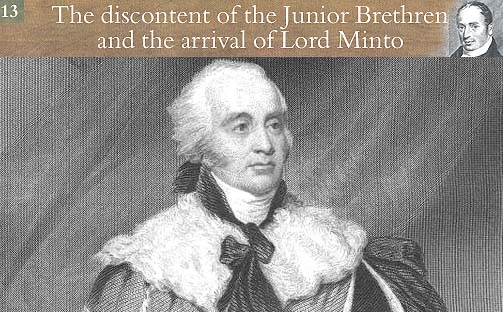

The Right Hon. the Earl of Minto, Governor-General, British India, 1807-1813. Courtesy 'The Centre for the Study of the Life and Work of William Carey D.D., 1761 - 1834.'
The senior missionaries at Serampore had been concerned for several years about the disappointed wishes and uneven tempers of the Junior Brethren, some of whom expressed strong dissatisfaction that they were not allowed an equal share of authority with Carey, Marshman and Ward. The Senior Brethren had steered the vessel of the Mission through the most dangerous quicksands, and the most violent tempests, and the management of the Mission required a combination of the highest prudence, ability and energy. Those who desired to take the helm did not have these qualities, and their capacity for administration was in inverse proportion to their eagerness to grasp it. So vehement was the opposition that Carey and the others faced that they were constrained to submit the correspondence to the Society.
Andrew Fuller wrote back that if such factious antagonism was not discontinued, the Committee would feel it their painful duty to recall those who appeared so impracticable.
In 1807, a meeting of the whole body of missionaries was held, and it was unanimously resolved that 'the brethren at Serampore, as well as those in subordinate stations, should hereafter choose their own coadjutors.' It was provided that each station should be independent as to its family connections, and those who formed it should be associated together only by their own consent; that these distinct families and stations should constitute one general Mission, with a committee and secretary to transact business at Serampore. The 3 senior missionaries formed the committee, and Mr. Rowe was chosen as secretary.
The extent of the embarrassment caused by these contests can be estimated by Ward's remarks on the resolution in a letter to Andrew Fuller:
'The burden of four years has been taken off my mind. I have been sighing over the Mission and its fate, when it should fall into the hands of Mr.--- and Mr. ---; but this regulation prevents all I feared. My dear Fuller, all that is human that we want at present is, one or two tried men, qualified to translate and to govern honestly and mildly when we are dead and gone. You send us raw young men, perhaps religious adventurers. One of them tells me he once wanted to go to the West Indies, as a clerk, or something in a plantation; then to become an officer; last of all, he became a missionary. He is really a good man, but to him the Mission is a sinecure.' Later he writes of the difficulties of the year 'then came the settling of matters in our own family, whether the Mission should be quite open, and become prey to some little tyrant, or whether the preservation of it should be formally provided for. This last has been done, so that no adventurer, either at Serampore, or at any other station, will be able to assume the reins without being called to it in a regular way.'
Lord Minto had been appointed by the House of Commons as one of the managers to conduct the impeachment of Warren Hastings. He had then been Governor of Corsica and the British Ambassador to Vienna. His views on the evangelization of India probably coincided with those of William Pitt, who had declared in Parliament 14 years before, that he considered all schemes of proselytism as wrong in themselves and as productive, in most cases, of abuse and political mischief.
Minto's arrival in India coincided with the news of the 'Vellore Massacre', which was widely attributed to tampering with the religious prejudices of the natives. In Calcutta, his mind was thus prepared to receive, with confidence, the representations of the anti-missionary party, of the danger of 'any interference with the religious prejudices of the people', and of the necessity of restraining missionary efforts.
On 2nd September, 1807, Carey was required to attend the office of the Chief Secretary, Mr. Thomas Brown. Mr. Edmonstone, the Secretary of the Secret and Political Department was also in attendance.
At this meeting, Carey was asked if he was aware of a pamphlet, published by the Serampore Press, containing strictures on Mohammedanism and its founder, which had been circulated within the Presidency. Carey was not aware of its existence. Mr. Edmonstone proceeded to point out those parts of the pamphlet which were regarded as inflammatory and dangerous. Carey replied that he by no means approved of the use of abusive language in reference to the religion of Mohammed, or its founder, such was not the practice of the missionaries in their intercourse with the natives. He withdrew after assuring Mr. Edmonstone that measures would be adopted to suppress the pamphlet.
Carey returned to Serampore, and desired the fullest explanation of the circumstances connected with the pamphlet. He learned from the reply of his brethren that they had already been made acquainted with the displeasure of the Government. Lord Minto had forwarded to Colonel Krefting, the Governor of Serampore, a translation of the pamphlet, with a letter stating that its style and tenor could produce no other effect than to irritate the minds and inflame the zeal of the Mohammedans. The letter stated that no decisions had been made as to what measures would be taken to preserve public tranquillity, but, as an object of immediate urgency the missionaries should surrender all copies and state to what extent it had been circulated.
The missionaries expressed their extreme regret to Colonel Krefting and explained that some 3 months previously they had delivered to a Mohammedan moonshee, who had embraced Christianity, a short abstract of a life of Mohammed, in the Bengali language. The confidence they had in this moonshee persuaded them to put the pamphlet to press without revision. They now found to their regret, that he had foisted in epithets that were not in the original - designating Mohammed a tyrant - and adding, with the zeal of a new convert , remarks which were calculated to give umbrage to Mohammedans. They stated that the Christian religion expressly disallowed the use of irritating expressions for its propagation. They stated that the edition of this pamphlet consisted of 2,000 copies, of which 1,700 remained in store. These were sent to Colonel Krefting to be surrendered to the British Government. A letter from the missionaries, together with one from the Danish Governor, was sent to Lord Minto The Governor expressed the earnest hope 'that no further measures would be taken in this matter, as he was ready, on the first application from the British Government, to check any abuses that might arise.'
The anti-missionary party, now in the ascendant in the Council Chamber, had obtained complete possession of the mind of the Governor-General within the first month of his arrival in India. The time appeared to be favourable for an attempt to root out the Mission altogether. The members of the Government appear to have thought that they had suddenly detected a great missionary conspiracy which threatened the loss of the British empire, and required to be treated with promptitude and severity. They sent for Mr. Blacquiere, the Magistrate, and desired him to ascertain and report on the proceedings of the missionaries in 'disseminating pamphlets, and in meetings stated to be held in the town of Calcutta for the purpose of exposing to the natives the error of their religion, and of persuading them to adopt the Christian faith.'
Mr. Blacquiere 'directed a Brahmin in his service to attend the missionaries, under a pretended desire to become a convert, and to obtain copies of their publications.' The Brahmin called on Ward, under the guise of an enquirer, and obtained 11 pamphlets. The pamphlets were translated with extraordinary speed.
On Sunday 6th September, 1807, Mr. Blacquiere sent another of his spies to watch the proceedings of the missionaries at the little chapel in the Chitpore Road. He reported that an elderly Bengali rose and dwelt on the wicked life Brahmins, and other persons of respectability led, under the impulse of their own evil inclinations. He then questioned the existence of any difference between Brahmins and other men. The informer further reported that a European then ascended the pulpit and preached to the congregation, which consisted of Armenians and native Portuguese, some men and some women, but, with the exception of two converted natives, there were neither Hindus nor Mohammedans in the room. A crowd of natives were collected at the door, but there was not a single person of respectability among them; all whom he recognised were living a disreputable life.
Two days after, Mr. Edmonstone presented the deposition of the informer to the Council, together with translations of the pamphlets. He stated that they contained strictures on the Hindu deities, which tended to exhibit them in a hateful and disgusting light, and dwelt on the fallacy of the Hindu mythology, and exhorted the natives to embrace Christianity.
The Council deliberated and recorded their solemn conviction that 'the distribution of tracts, and the practice of preaching to the multitude were evidently calculated to excite among the native subjects of the Company a spirit of religious jealousy and alarm, which might eventually be productive of the most serious evils, and that Government was bound by every consideration of general safety, and national faith and honour, to suppress, within the limits of the Company's authority in India, treatises and public preachings offensive to the religious persuasions of the people.'
It was determined, therefore, immediately to prohibit all preaching in Calcutta in the native language, and to break up the Press at Serampore. A letter was sent to Carey prohibiting those services and desiring that the Press should be removed to Calcutta without delay.
The alarmists had taken advantage of Lord Minto's inexperience, and his ignorance of the conduct of the missionaries for the last 7 years, and in the course of a single week had hurried him into suppressing missionary tracts, prohibiting preaching in Bengali, and seeking removal of the Press to Calcutta.
The order regarding the Press reached Serampore on the 11th September, and filled the minds of the missionaries with dismay. They felt that its transfer to Calcutta must break up the Mission. The mere expense of living in the metropolis would have been ruinous.
The missionaries held a meeting to seek Divine guidance during this crisis. They then waited on the Governor with the public letter.
Colonel Krefting was justly offended that the missionaries should have been dealt with as though they were living under the British jurisdiction, and that a communication so deeply affecting the independence of the settlement, should not have been made in the first instance to him. He was indignant that Lord Minto should interfere with a missionary establishment which the King of Denmark had taken under his especial protection.
The missionaries proceeded to Mr. Brown's residence at 'Aldeen' where it was decided that Carey should simply acknowledge receipt of Mr. Edmonstone's letter, and that a memorial should be presented to the Governor-General in Council.
The next day, Ward went, as usual, to Calcutta and the Armenian friends called on him to enquire how they should act. He stated that he and his colleagues were positively forbidden to preach to them, and they must conduct their services among themselves. In his journal he observes:
'The Doorgah-Poojah, the most magnificent idolatrous festival in Calcutta, would, in a few days, be celebrated with pomp and splendour; that all public offices would be closed, and public business suspended for eight or ten days; and that the mansions of opulent natives would be thrown open for the reception of European guests, to witness the dances before the idol; (1) and that hundreds of splendid processions would be paraded though the Chitpore Road, and pass in front of the house of Christian prayer, which had just been closed on the orders of a Christian Government.'
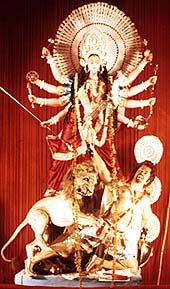
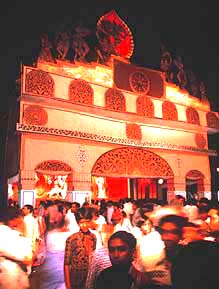
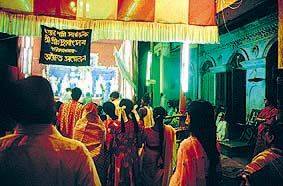
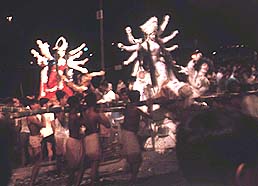
Hindu Gods displayed in temporary 'pandals' in the Chitpore Road during the 1979 Durga Puja Festival. At the end of the Festival all the statues are carried in procession to the Hooghly and immersed. The river carries them away and the mud and straw quickly dissolve. Bottom right, at the water's edge. A montage of sounds from the Puja festival. The early morning processions move towards the river through Dalhousie Square; drummers play before the images of the Gods in the 'pandals' of the Chitpore Road; and, at the end of the festival, crowds move through the Maidan towards the river for the ritual immersion of the images. Lord Minto wrote to the Governor saying that it was 'obviously regular and highly expedient that the press of the missionaries should be placed under the immediate control of the Government of India.' Colonel Krefting showed the letter to the missionaries, who held another prayer meeting, at which Carey was so deeply affected he 'wept like a child.' The Governor assured them that he would not allow the Press to be removed, and would procure a reversal of the order by conciliation.
Ward did not consider this course wise or prudent, and immediately sent his brethren the following minute:
'I have a great deal of hesitation in my mind respecting our remaining in sullen silence after the English Government have addressed us through Brother Carey and the Governor. As it respects ourselves, even if we are not compelled to go to Calcutta with our press, the having them as our avowed and exasperated enemies is no small calamity. They may deprive us of Brother Carey's salary, with which we can hardly get on now, and without which we must put an end to the translations, and go to jail in debt. They can shut up the new meeting in Calcutta; they can stop the circulation of our grammars; Dictionaries, and everything issued from this press in their dominions; they can prohibit our entering their territories. As it respects Colonel Krefting, we ought to deprecate the idea of embroiling him with the English Government, if we can possibly avoid it. I think, therefore as we can now officially through him address the British Government, we should entreat their clemency, and endeavour to soften them. Tender words, with the consciences of men on our side, go a long way. We can tell them that to take the press to Calcutta would involve us in a heavy and unbearable expense, and break up our family, and that we will give them every security they would wish, by subjecting the press to the absolute control and inspection of the Government here; nay, that we are willing to do everything they wish us, except that of renouncing our work and character as Ministers of the Saviour of the world. To this Colonel Krefting can add what he likes. If they listen to this we are secured, with all the advantages of their sufferance. If they are obstinate we are still at Serampore. I entreat, you dear brethren, to weigh these things, and give them all the attention that our awful circumstances require.'
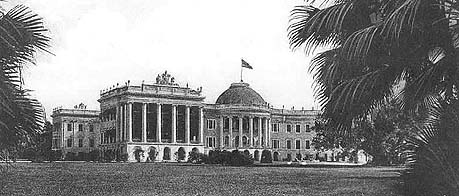
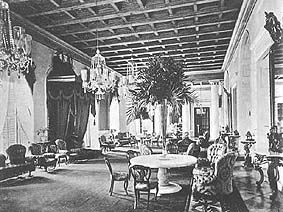
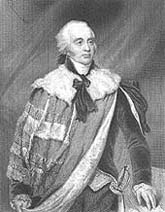
Top: Government House, Calcutta; bottom left: The Throne Room, Government House; both from turn of the 20th century postcards. Bottom right: Lord Minto, courtesy 'The Centre for the Study of the Life and Work of William Carey D.D., 1761 - 1834.'
Ward's proposal met with the approbation of his colleagues. He renewed, with much importunity, the advice he had previously given them to seek a personal interview with Lord Minto. He argued that the Moravian missionaries never omitted to cultivate a good understanding with the Governors, wherever their Missions were planted, by making themselves personally known to them and explaining their plans of operation.
While the missionaries were deliberating on this proposal, they received a visit from Dr. Leyden, the renowned orientalist and literary associate of Walter Scott. He had proceeded to India at the invitation of Lord Minto, in whose estimation he stood high. The missionaries explained the difficulties to him, and sought his counsel. He very warmly supported Ward's advice, urging that Carey and Marshman should wait on Lord Minto, on the next day, as the translators of the 'Ramayan', and present him with a copy.
Lord Minto received them the next day, and they soon felt at ease in the presence of the man on whom their fate depended. Marshman broke the subject of their visit, and asked permission to present a private memorial to him. Lord Minto drew back at a request that reminded him of the letter he had sent to the Governor of Serampore a few days before, and he coloured up for a moment, but did not hesitate to assure them that he would receive it. They explained to him the origin and the purpose of the Mission, their degree of success, and delicately brought their conversation round to the object of their audience - the ruin with which their missionary plans were threatened by the order to transfer the Press to Calcutta. Lord Minto asked a number of questions, assured them that he felt no hostility to them, or to their undertaking, and said that he thought the conversion of the natives, in a quiet way, a desirable object, but feared there was danger in provoking the Mahommedans. Twenty minutes were passed in friendly conversation. As they rose to depart, he said that they must be aware that a private paper could not be brought on the records of Government, but he promised to pursue it with attention, and place it in the hands of colleagues.
Carey and Marshman returned to Serampore, and Marshman sat down to prepare the memorial on which the existence of the Mission would hang. It was signed by the whole body of missionaries, and sent over to Barrackpore, opposite Serampore, on Thursday, 1st October, 1807. It was read the next day at the Board, together with a letter from Colonel Krefting. On perusal of these 2 documents, the Supreme Council passed a resolution revoking the Press order, and simply requiring the missionaries to submit works intended for circulation in the British dominions to the inspection of the officers of the British Government.
This was felt to be a most signal deliverance from impending ruin, and the missionaries, after having held a meeting of thanksgiving, went down to Calcutta to return their thanks to Lord Minto.
(1) To see an 1840 water colour of 'Entertainment during Durga Puja' by William Prinsep, click on the link.